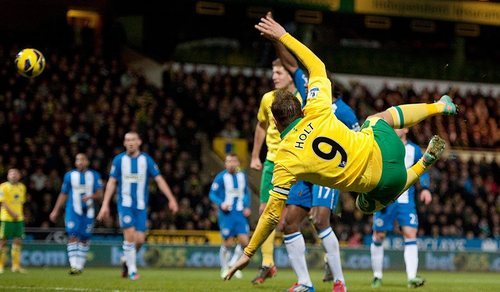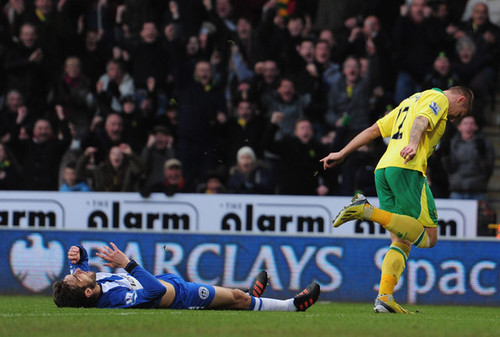How are Norwich City’s Canaries flying so high?
How are Norwich City’s Canaries flying so high?


Losing felt strange for Jonny Howson. For the first time since the 6th of October, Howson, a midfielder for Norwich City, and the rest of his mates left the field without a point, losers in a cruel 4-1 defeat to Aston Villa in the League Cup last week. But it is an odd feeling to have for someone on a club with one main goal in mind: survival. Losing is familiar, not so foreign, for teams fighting regularly against the ghastly spectre of relegation.
Not for Norwich — no longer, anyway. Plummeting into the basement of the Premier League early in the new season, conceding 17 goals in their first seven games, the Canaries spread their wings just before splattering on the ground. They beat Arsenal in October, then Manchester United, and have not lost a game in the league since. Unbeaten in 10 matches, they only trail Barcelona — who are off to the best start La Liga has ever seen — in form.
So, yes, Howson and his teammates can be forgiven for feeling out of place, perhaps on the wrong side of the pitch, when they lost on December 11th. Allowing eight goals in their past three games, Norwich have caught a whiff of the stench of their heavy losses to Fulham and Chelsea earlier in the campaign, 5-0 and 5-2, respectively. Old habits die hard, sure, but manager Chris Hughton has righted many wrongs in the past two months, corrected many blunders, recalibrated a team shell-shocked by the departure of the boss that earned back-to-back promotions with the club and brought them back to the highest level of English football: Paul Lambert, now currently patrolling the lines of Villa.
But let us not forget in the first place what brought Norwich to this point of renaissance, 8th in the Premier League and four points away from a Champions League spot. Hughton has gone back to the basics in training, preaching the art and virtues of defending in a league so desperately deprived of it. His pupils have listened. One of the few smaller clubs to summon the spirit of defensive, counter-attacking football to beat the odds — and the favourites — Norwich have held a great shape about them. They have performed like Celtic in the face of offensive juggernauts, playing to the needs of the game, substance meaning more to them than style.
In a 1-0 win over United, the Canaries played with the structure of migrating birds, all knowing their position, all working with direction, all preparing for a cross, a shot, in unison. They moved like a phalanx at times, defending with banks of four. And then they took their chances. Anthony Pilkington looped a header over Anders Lindegaard, one of only four shots on goal, and that was all that was needed. At the dawn of each opportunity presented to them, Norwich take them, not leaving a crumb behind. There’s no wasting any morsel of fodder at Hughton’s table. The manager has taught his team proper manners.

Whereas Reading and United have scored seven goals in one half, the former and Arsenal notching 12 in one game, Norwich have conceded only eight times over those past 10 sterling Premier League games. And they have done so in the same kind of way you can beat Barcelona: without the ball. They don’t care for any statistics of possession. They will hold the ball, on average, for roughly 42% of the time, absorbing and deadening the ferocity of the forces against them. They’ll dare their adversary to play with the ball. And then, like a lion stalking prey, Norwich strike. From the flanks, Javier Garrido, the defender on loan from Lazio, has lifted balls into dangerous areas of the 18-yard box. Robert Snodgrass, once flicking a ball to Steven Whittaker in Norwich’s opening goal in a 4-3 win at Swansea, has produced plays out of nothing and teed up goals with the swing of free kicks. And Sebastien Bassong, scorer of three goals in his past five outings, has learned how to fly like a Canary and bag goals with the turn of his head.
And that’s how they’ve scored, a routine of headers and set pieces practised, no doubt, for this desired effect. “Hughton’s men have scored a higher proportion of headed goals (41.2%) than any other side in the Premier League,” writes Alistair Tweedale of whoscored.com on ESPN, “as well as the highest proportion of goals from set-piece situations, with 47% of theirs coming from free-kicks or corners.”
One of Norwich’s such architects is Wesley Hoolahan. His surname is as fun to say as he is fun to watch. He likes to conjure. You shan’t restrict him. But he once was a caged canary. Hoolahan was a starving artist without a home, deployed as a winger, in midfield, lacking the pace and height to dominate without the ball. He has since found his niche. The 30-year-old plays with the invention of an artiste and the industry of a Dubliner — and now with freedom. He can weigh passes, but he will also never die in the pursuit of a ball. Against Wigan on Saturday, rushing toward goal, Hoolahan lost control of the ball to a defender. It all could have ended. But he slid and wiped a second ball to Pilkington, who duly smashed it inside the near post. Like the tuning of an instrument, Hoolahan has found the right stroke of harmony with Pilkington, who later set up his teammate with a surging cross for the winning goal in that 2-1 win over Wigan — a pungent header for someone standing 5-foot-5. Together, they agree, standing out in a team no one, let’s face it, expected such quality from.
It is, too, harder for their opponents to drown them out. Norwich find little ways to neutralize any threat. They’ll waste time here and there. They’ll turn down the tempo of play like excessive volume. Norwich don’t fancy all that racket, the bravado of aggressive football, the bluster of an opponent huffing and puffing to blow the defence down on their feet. They want peace and cutting silence, a swift goal on the counter the easiest way to mute the opposition.
Perhaps most importantly, Norwich know how to stabilize themselves when in danger. (And in the past two weeks, Norwich have had their lead reduced or taken away altogether, only for them to come back.) In the second half against Swansea, much like a dam under grave amounts of pressure, Norwich gave way to the Swans’ attack. They leaked one, two, three goals. But Norwich had built such a comprehensive lead in the first half — 3-0 — that that the seepage of goals in the second didn’t cause irreparable damage. When they can’t dispel the storm, they’ll ride it out.
Then came a rare treat for the fans of this burgeoning side: a first away win of the season. Norwich fans, young and old, have travelled up and down England following their team — shipping from East to West for the game at Swansea in Wales, a trip worth several hours — and only then did they experience victory on the road.
Yet only know are some beginning to take notice of Norwich’s run in form, partly because they don’t play at Stamford Bridge or Old Trafford or Emirates Stadium. Most of the reporting comes from the confines of news agencies in London, observers far from the action, looking at the results without feeling the impact of them. Norwich have slowly dragged themselves out of the relegation zone and into the middle of the pack without so much ado. And they will probably enjoy the hush. They have quietly built a fortress at Carrow Road, where they have not lost since September and won five in a row. They have brought a little civility and tactical awareness to a league of bashful defending and sadistic goalscoring. They are resuscitating an art dying around Europe. They will not compromise a win with glamour and chic and goals and elegance. Because there is a greater goal that has not changed: continued existence in the Premier League. And, if realized, maybe then and only then will losing truly feel out of the ordinary.
Anthony Lopopolo is a regular contributor to AFR, with an expertise in Italian calcio and European football. You can follow him on Twitter at @SportsCaddy. Comments below please.







